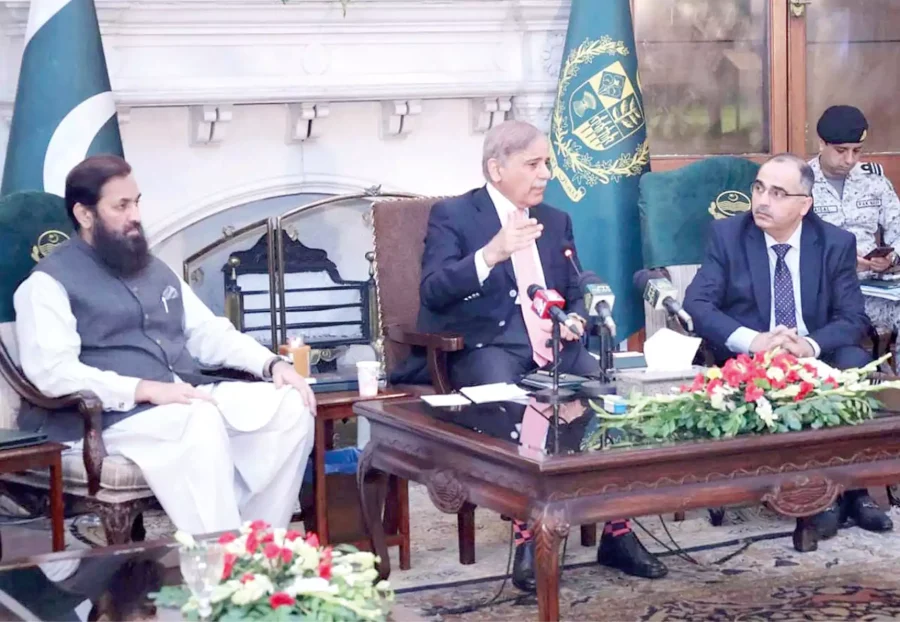Prime Minister Shehbaz Sharif on Saturday blamed the spiralling circular debt for increase in electricity rates, saying it was a condition set by the International Monetary Fund to strike the crucial $3 billion bailout agreement with the global lender.
The statement came as the government implemented an increase in the average power tariff by Rs4.96 per unit for the financial year 2023-24. This adjustment places an additional burden of Rs3,281 billion on consumers throughout the ongoing financial year.
The tariff hike can be seen as a fulfilment of the government’s commitment to the IMF to raise electricity rates. Following this increase, the average national tariff has risen from Rs24.82 per unit to Rs29.78 per unit.
During a conversation with traders and industrialists in Lahore, PM Shehbaz said that there was no other way but to initiate drastic structural and economic reforms, for which unity, sacrifices and struggle from all stakeholders was needed to face the prevailing challenges and steer Pakistan out of economic and other problems.
“The IMF demands an increase in electricity prices but we also have the problem of circular debt. I admit that the burden of taxes is overwhelming,” he added. Highlighting the efforts made behind the scenes for the crucial IMF deal, the premier said that all stakeholders contributed to saving the country from default.
“We have to, unfortunately, do this increase in the electricity prices because not only is it an IMF demand but where is the circular deficit going?” The premier acknowledged that there were line losses and transmission losses but also pointed out the issue of electricity theft. He called on the business community to disassociate itself from those in the industry who were engaged in the sordid practice.
“China has provided $5 billion in the past three to four months. The US Secretary of State also welcomed the agreement with the IMF. Saving Pakistan from default is a success, but the revival of the programme is not,” he maintained.
The prime minister said that the economy suffered due to the wrong decisions of the previous government. “National interests were sacrificed for political gains, and our government spent 15 months just rectifying relations with the United States,” he said, asking why the previous government did not provide the promised Rs3 billion loans to small and medium-sized enterprises.
“We all have to be prepared for sacrifices to take Pakistan towards prosperity,” he added. Sharing his telephonic conversation with IMF Managing Director Kristalina Georgieva with the business community, the PM said that she expressed her reservations about the mistrust created in the past.
Shehbaz said he assured the IMF MD that the incumbent government would complete its constitutional term on August 14, and after that the interim government would continue honouring the agreement.
He added that unfortunately, Pak-US relations were hit hard by the ill-conceived decisions and remarks by the previous government, but the present coalition government, with collective efforts, had normalised and improved ties with Washington.
“We have to take optimum benefit from the IMF deal by utilising the amount on economic development and people’s prosperity,” he said.
PM Shehbaz further said that providing facilities to industry and commerce was the government’s responsibility.
He said the government was taking all possible measures for the promotion of industry and agriculture, however, in the given circumstances and in the face of grave challenges, “industrialists and the business community will have to play their role even more actively for enhancing exports and stabilising the economy.”
“The business community should also consider the fact that despite having rich resources, why Pakistan’s economy was unable to achieve the desired targets and its full potential,” he said, adding that Bangladesh’s textile sector totally rely on imported cotton, but it was developing fast and gaining a niche in the global market, while Pakistan’s textile was losing competition in the export markets.
The premier asserted that Pakistan had been producing 14bn cotton bales, but today, it had decreased to a mere 5bn bales, ruing that it was a “collective failure”.
“We are living in a regime where the industry has become nothing but rental income, as we are not ready to face challenges or to adopt modern technology,” he regretted and added that support and subsidies from the government were not materialised properly.










